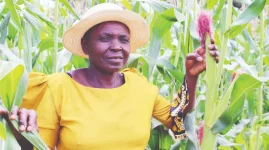Maize means everything to Ranganai Shonhiwa from the Murehwa district in Zimbabwe. At 56 years old, she depends on this crop to feed her family and pay for school and medical care. But growing weather problems have made farming harder than ever before. The rain comes at the wrong times or not at all, which hurts her crops badly.
Scientists worked for many years to create better corn seeds that can survive dry weather. These special types of maize stand up against the harsh heat caused by our warming planet. Ranganai knows firsthand how tough farming has become, with bad weather patterns making each season a gamble for her livelihood.
Thousands of acres of corn across Zimbabwe have died during recent dry spells. Many farm families fell into hunger and poverty, needing government help to survive. Luckily, things started looking up for Ranganai a few years back. She began planting hardy corn seeds that handle drought much better than old varieties.
Her first try with these special seeds happened around 2016. The results amazed her—she harvested 30 bags from each hectare of land, double what she used to grow before trying the new seeds. Ranganai talks about working hard every day with hope shining in her eyes. She believes their efforts might lead to better days ahead for everyone.
These improved corn seeds came from over twenty years of teamwork between government agencies, charity groups, seed companies, and local farmers. The International Maize and Wheat Improvement Centre created these drought-fighting plants. According to Dr. Mainassara Zaman-Allah, who represents this group in Zimbabwe, these special hybrids produce up to 20 percent more corn than regular types, even during dry weather.
The Centre leads several big projects focused on making stronger corn plants. They started with programs called Drought Tolerant Maize for Africa and Stress Tolerant Maize for Africa. Their newest effort aims to speed up improvements in both corn and wheat to fight climate change issues.
Farmers throughout Zimbabwe keep discovering how helpful these new crop varieties can be. Martha Chivengwa tells a similar success story from her farm in Murehwa. At 72 years old, she saw amazing changes after switching to drought-resistant seeds. Martha explains she harvested almost nothing from her fields before. After trying the drought-resistant seeds, she collected 50 kilograms of white corn.
The research center continues supporting farmers across 19 different districts. They show them how to try these seeds on their land and teach smart farming methods that help grow good crops despite challenging conditions. Dr. Christian Thierfelder from the center explains how caring for soil plays a huge part. Farmers learn to disturb the ground less and plant beans alongside corn or rotate between crops to make soil healthier naturally.
These farming methods build stronger soil that holds water better and withstands weird weather patterns. The ground stays moist longer during dry spells and can handle heavy rain without washing away. Healthy soil gives crops their best chance to survive no matter what strange weather comes their way.
Scientists worked for many years to create better corn seeds that can survive dry weather. These special types of maize stand up against the harsh heat caused by our warming planet. Ranganai knows firsthand how tough farming has become, with bad weather patterns making each season a gamble for her livelihood.
Thousands of acres of corn across Zimbabwe have died during recent dry spells. Many farm families fell into hunger and poverty, needing government help to survive. Luckily, things started looking up for Ranganai a few years back. She began planting hardy corn seeds that handle drought much better than old varieties.
Her first try with these special seeds happened around 2016. The results amazed her—she harvested 30 bags from each hectare of land, double what she used to grow before trying the new seeds. Ranganai talks about working hard every day with hope shining in her eyes. She believes their efforts might lead to better days ahead for everyone.
These improved corn seeds came from over twenty years of teamwork between government agencies, charity groups, seed companies, and local farmers. The International Maize and Wheat Improvement Centre created these drought-fighting plants. According to Dr. Mainassara Zaman-Allah, who represents this group in Zimbabwe, these special hybrids produce up to 20 percent more corn than regular types, even during dry weather.
The Centre leads several big projects focused on making stronger corn plants. They started with programs called Drought Tolerant Maize for Africa and Stress Tolerant Maize for Africa. Their newest effort aims to speed up improvements in both corn and wheat to fight climate change issues.
Farmers throughout Zimbabwe keep discovering how helpful these new crop varieties can be. Martha Chivengwa tells a similar success story from her farm in Murehwa. At 72 years old, she saw amazing changes after switching to drought-resistant seeds. Martha explains she harvested almost nothing from her fields before. After trying the drought-resistant seeds, she collected 50 kilograms of white corn.
The research center continues supporting farmers across 19 different districts. They show them how to try these seeds on their land and teach smart farming methods that help grow good crops despite challenging conditions. Dr. Christian Thierfelder from the center explains how caring for soil plays a huge part. Farmers learn to disturb the ground less and plant beans alongside corn or rotate between crops to make soil healthier naturally.
These farming methods build stronger soil that holds water better and withstands weird weather patterns. The ground stays moist longer during dry spells and can handle heavy rain without washing away. Healthy soil gives crops their best chance to survive no matter what strange weather comes their way.












